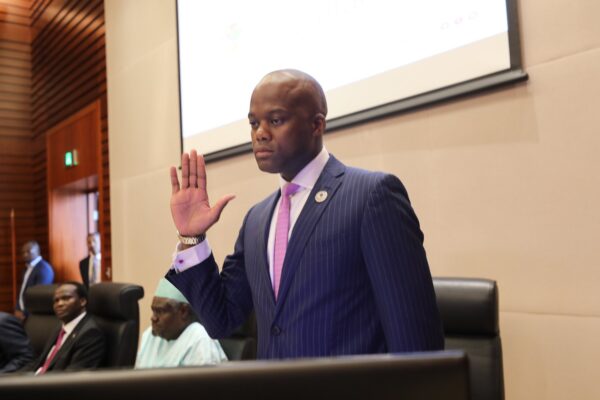The much anticipated African Continental Free Trade Area (AfCFTA) has become operational effective January 1, 2021 after months of delay due to the coronavirus pandemic.
Officials of the secretariat in-charge of executing the trade zone had promised the deal will be operational on July 1, 2020.
But when the Covid-19 hit hard, it affected plans and forced the setting of a new date for operating the deal.
African Union Heads of State and Government during a virtual meeting of the 13th Extra Ordinary Session of the Assembly of the Union on the AfCFTA, on Saturday 5 December 2020 underscored the urgent need for member states to kick-start trading activities.
The AU Chairperson, Cyril Ramaphosa said “Throughout this process, we have stood united, with 55 sovereign AU Member States rallying together, despite different levels of economic development and diverse strategic priorities.
The commencement of trading under the AfCFTA on the 1st of January 2021 is one of the most significant milestones in the continental integration project”.
Statement by the Secretary-General of the AfCFTA Secretariat, H.E. @MeneWamkele, at the #AfCFTA Start of Trading Ceremony Webinar @ https://t.co/YXP5CWG0ZO pic.twitter.com/zZVIq4Egfv
— African Union (@_AfricanUnion) January 1, 2021
Largest free trade area
The trade zone will be the world’s largest free trade area uniting 1.3 billion people and creating a $3.4 trillion economic bloc.
The free trade zone is considered a critical action to usher Africa into a new era of development.
The African Continental Free Trade Area (AfCFTA) will have 54 African Union (AU) members.
African countries only do about 16 per cent of their business with each other with the African Union hoping to change this trend with the deal when it comes into effect.
The AfCFTA is a major project of the AU’s long-term development plan Agenda 2063, which emphasis the need to ease trade and travel across the continent.
South African President Cyril Ramaphosa said the AfCFTA will boost intra-African trade, promote industrialisation and competitiveness and contribute to job creation, and it will unleash regional value chains that will facilitate Africa’s meaningful integration into the global economy.
The African Continental Free Trade Area will fundamentally change the economic fortunes of our continent. I call on the entrepreneurs of our nation to seize the abundant opportunities that this historic development will present to explore new markets and build new partnerships. pic.twitter.com/OXX9yM4ePl
— Cyril Ramaphosa ?? #StaySafe (@CyrilRamaphosa) January 1, 2021
The AfCFTA will also improve the prospects of Africa as an attractive investment destination.
It will help advance the empowerment of Africa’s women, by improving women’s access to trade opportunities which will in turn facilitate economic freedom for women, and expand the productive capacity of countries.
Secretariat based in Ghana
40-year-old South African Wamkele Mene was sworn in as the first Secretary General of the AfCFTA Secretariat last year.
He will be running the secretariat with 500 different staff from across the continent to be based in Ghana’s capital Accra.
The secretariat which is housed in the Africa Trade House in Accra will be the focal point for the coordination of the continent’s biggest trade area.
Cheers to the launch of Trading #AfCFTA,to Those who put it all together and the rest of us who have to join in to make it work and worthwhile!! #AU. Happy New Year All.
— Paul Kagame (@PaulKagame) January 1, 2021
Mene has said that as at the end of December, 2020, “54 countries have signed the agreement while 34 countries have deposited their instruments of ratification, and 41 countries/customs unions have submitted their tariff offers, including the EAC and ECOWAS.”
He adds that for the AfCFTA to be inclusive and to ensure shared growth across the continent; women, young Africans and SMEs have to be at the heart of its implementation.

African Trade analyst, Emmanuel Bensah told Africa Feeds that the “this new AU agency creates in Accra a new diplomatic capital responsible for promoting intra-African trade.”
He adds that “in addition, it will create immense opportunities and jobs for service-providers befitting of any diplomatic capital worldwide, such as Brussels; Geneva; New York.”
Source: Africafeeds.com


